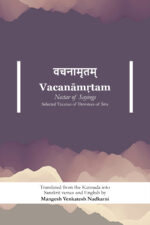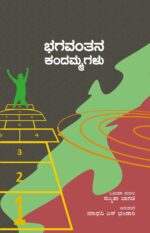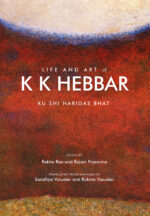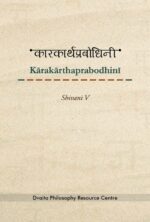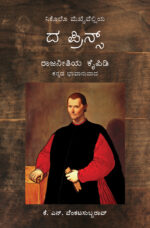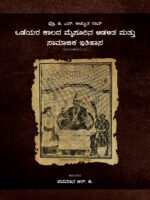Humanitarianism and Democracy (Maanava Dharmah – Prajaaprabhutvam Cheti Shatakadvayam)
₹240.00
Author: M V Nadkarni
These Satkarnas are Prof Nadkarni’s passionate plea for an authentic democratic order which guarantees the rights of every citizen while each citizen participates in it being fully aware of his / her duties. The complementarity of rights and duties is shown to be the essence of genuine democracy.
Interested customers may write to us at mup@manipal.edu about purchasing the book.
| Also available on |
| Category: | Texts in Translation |
|---|
| Author | |
|---|---|
| Format |
Related products
-
Christa Shaka 1800 Ra Modalina Mysooru ithihaasa
₹295.00Author: D S Achuta Rao Translator: S Narendra Prasad
೧೮೦೦ ಕ್ರಿ. ಶ. ದ ಹಿಂದಿನ ಮೈಸೂರು ಇತಿಹಾಸವು ಪ್ರೊ. ಡಿ ಎಸ್ ಅಚ್ಯುತ ರಾವ್ ಅವರ ಜೀವನ ಮತ್ತು ಕೆಲಸದ ಬಗ್ಗೆ. ಮೈಸೂರು ಇತಿಹಾಸದ ಕುರಿತಾದ ಅವರ ಸಂಶೋಧನೆಯು 1940-65ರ ಅವಧಿಯಲ್ಲಿ ಅವರು ಪ್ರಕಟಿಸಿದ ಹತ್ತು ಸೂಚ್ಯಂಕ ಲೇಖನಗಳಿಂದ ಪ್ರತಿನಿಧಿಸುತ್ತದೆ. ಅವರು ಭಾರತದ ಇತಿಹಾಸ ಮತ್ತು ಅದರ ಅದ್ಭುತ ಭೂತಕಾಲವನ್ನು ಸಕ್ರಿಯವಾಗಿ ಜನಪ್ರಿಯಗೊಳಿಸಿದರು. ಮಹಾರಾಜಾಸ್ ಕಾಲೇಜ್ ಹಿಸ್ಟರಿ ಸೊಸೈಟಿ, ಭಾರತದ ವಸಾಹತು ಸಂಶೋಧಕರು ಮತ್ತು ಕನ್ನಡ ವಿಶ್ವಕೋಶದಲ್ಲಿ ಮೈಸೂರು ಸರ್ಕಾರದ ಉಪಕ್ರಮದಿಂದ ಭಾರತೀಯ ಇತಿಹಾಸದಲ್ಲಿ ಉಪಕ್ರಮಗಳನ್ನು ಪ್ರಸ್ತುತಪಡಿಸುವುದರಿಂದ ಅಂತಹ ಮೂರು ಲೇಖನಗಳನ್ನು ಸೇರಿಸಲಾಗಿದೆ. ಎರಡನೇ ಭಾಗದಲ್ಲಿ ಅವರ ಜೀವನಚರಿತ್ರೆಯಲ್ಲಿ, ಅವರ ವಿದ್ಯಾರ್ಥಿಗಳು ಮತ್ತು ಮಕ್ಕಳು ಶಿಕ್ಷಕ ಮತ್ತು ತಂದೆಯಾಗಿ ಅವರ ಜೀವನದ ಬಗ್ಗೆ ಬರೆದಿದ್ದಾರೆ, ಅವರ ಅವಧಿಯ ಸಂದರ್ಭವನ್ನು ಒದಗಿಸಿದ್ದಾರೆ. ಪುಸ್ತಕವು ಕಳೆದ ಶತಮಾನದ ಮಧ್ಯದಲ್ಲಿ ಇತಿಹಾಸ ಸಂಶೋಧನೆಗೆ ಆಸಕ್ತಿದಾಯಕ ವಿಂಡೋವನ್ನು ಪ್ರಸ್ತುತಪಡಿಸುತ್ತದೆ.
Interested readers may write to us at mup@manipal.edu about purchasing the book.
-
Vacanāmṛtam – Nectar of Sayings
₹600.00Translator : Mangesh Venkatesh Nadkarni
The Śiva Śaraṇas of medieval Karnataka left a rich legacy of what are called Vacanas, or “Sayings,” in Kannada. These Vacanas were far ahead of their times in social awareness. They deplored the caste system and discrimination, upheld the dignity of women in family and society, stressed on the priority of work, and advocated charity, in addition to devotion to One God – Śiva. They also imparted practical wisdom for living honourably and meaningfully in the world.
Though the book is primarily meant for those who do not understand the original in Kannada, Kannadigas can also benefit from it. This is because the most interesting (320) of the vast number of Vacanas (more than 20,000) are selected and made accessible in one place here. The translations here are not literal or mechanical. They bring out the intent of the Vacanas while being truthful to the original at the same time.
Manipal Universal Press (MUP) is dedicated to making Vacana Sahitya accessible to the English audience. As a part of this effort, we have published a book titled Akka Mahadevi: The Questioning Poet-Saint. This work explores the life and enduring legacy of Akka Mahadevi, the influential 12th Century Kannada poet whose profound vacanas continue to inspire readers today.
Interested customers may write to us at mup@manipal.edu about purchasing the book.
Also available on

-
Bhagavantana Kandammagalu
₹190.00Author: Susmita Bagchi, Translator: Madhavi S Bhandary
ಅನುಪೂರ್ವಾ ಒಲ್ಲದ ಮನಸ್ಸಿನಿಂದ ಅನಿವಾರ್ಯವಾಗಿ ಅಮೇರಿಕಾ ಬಿಟ್ಟು ಭಾರತಕ್ಕೆ ಬರಬೇಕಾಯಿತು. ಕಲಾಶಿಕ್ಷಕಿಯಾಗಿ ಅಲ್ಲವಳ ಜೀವನ ಸುವ್ಯವಸ್ಥಿತವಾಗಿ ಸಾಗುತ್ತಿತ್ತು. ಭಾರತಕ್ಕೆ ಹಿಂದಿರುಗಿದ ನಂತರ ಅವಳ ಬದುಕು ಆಮೂಲಾಗ್ರವಾಗಿ ಬದಲಾಯಿಸಬಹುದೆಂದು ಅವಳು ಕನಸು-ಮನಸಲ್ಲೂ ಎಣಿಸಿರಲಿಲ್ಲ. ಒಮ್ಮೆ ಅವಳ ಕಾಲೇಜಿನ ಗೆಳತಿಯೊಬ್ಬಳು ಸೆರೆಬ್ರಲ್ ಪಾಲ್ಸಿ (ಮೆದುಳಿನ ಲಕ್ವ)ಯಿಂದ ಬಳಲುತ್ತಿರುವ ಮಕ್ಕಳ ಶಾಲೆ ‘ಆಶಾಜ್ಯೋತಿ’ಯ ಪರಿಚಯ ಮಾಡಿಸಿದಳು. ಅಲ್ಲಿಯೇ ಸ್ವಲ್ಪಕಾಲ ಆರ್ಟ್ ಟೀಚರ್ ರೂಪದಲ್ಲಿ ಸ್ವಯಂಸೇವಕಿಯಾಗಿ ಕೆಲಸ ಮಾಡುವ ಅವಕಾಶವೂ ದೊರೆಯಿತು. ಚಿತ್ರಗಳನ್ನು ಬಿಡಿಸುವುದು ಹೇಗೆ, ಅದಕ್ಕೆ ಹೇಗೆ ಬಣ್ಣ ತುಂಬಬೇಕು ಇತ್ಯಾದಿ ವಿಷಯಗಳನ್ನು ಅಲ್ಲಿಯ ಮಕ್ಕಳಿಗೆ ಹೇಳಿಕೊಡಲಾರಂಭಿಸಿದಳು. ಆದರೆ ಆ ಮಕ್ಕಳು ಅವಳಿಗರಿವಿಲ್ಲದಂತೆ ಗೆಳೆತನದ, ಪ್ರೇಮದ, ನಗುವಿನ, ಎಲ್ಲಕ್ಕಿಂತಲೂ ಮಿಗಿಲಾಗಿ ರೋಗದೊಂದಿಗೆ ಹೋರಾಡುವ ಪಾಠ ಅರ್ಥಾತ್ ಬದುಕಿನ ವಾಸ್ತವಿಕತೆಯ ಪಾಠ ಕಲಿಸಬಹುದೆಂದು ಅವಳಿಗೇನು ಗೊತ್ತಿತ್ತು! ಹೊರಜಗತ್ತು ಅವರನ್ನು ಶಾರೀರಿಕ ಅಥವಾ ಮಾನಸಿಕ ದೃಷ್ಟಿಯಿಂದ ದುರ್ಬಲರೆಂದು ತಿಳಿದುಕೊಳ್ಳಲಿ! ಆದರೆ ಅವರ ಅಂತರಂಗದಲ್ಲಿ ಏನನ್ನಾದರೂ ಸಾಧಿಸಬೇಕೆಂಬ ಅಪಾರ ಕ್ಷಮತೆ ಅಡಗಿದೆ ಎಂಬುದು ಅವಳ ಅರಿವಿನ ಕ್ಷಿತಿಜವನ್ನೇ ವಿಸ್ತರಿಸಿತು. ಅನುಪೂರ್ವಾ ಮತ್ತಾರೂ ಅಲ್ಲ, ಸ್ವಯಂ ಲೇಖಕಿಯೇ! ಈ ಮಕ್ಕಳ ಅಂತರಂಗದ ಪುಟಗಳನ್ನು ಅತ್ಯಂತ ಹತ್ತಿರದಿಂದ ನೋಡಿದ್ದಾರೆ; ತಿಳಿದಿದ್ದಾರೆ; ಮತ್ತದನ್ನು ಶಬ್ದಗಳ ಮೂಲಕ ಕಾದಂಬರಿಯ ರೂಪದಲ್ಲಿ ಜೋಡಿಸಿದ್ದಾರೆ. ಈ ಒಂದು ರೋಚಕವಾದ ಕಥೆ ಒಡಿಯಾದಲ್ಲಿ ‘ದೇಬಶಿಶು’ವಾಗಿದ್ದುದು, ಅಜಯ್ ಪಟ್ನಾಯಕ್ರು ಅದನ್ನು ‘ದೇವಶಿಶು’ ವಾಗಿ ಹಿಂದಿಗೆ ಅನುವಾದಿಸಿದರು. ಆ ಹಿಂದಿ ಅನುವಾದವು ಜ್ಞಾನಪೀಠ ಪ್ರಕಾಶನದಿಂದ ಪ್ರಕಟಗೊಂಡಿದೆ. ಈ ಕೃತಿಯು ಬಿಕ್ರಮ್ ಕೆ. ದಾಸ್ರಿಂದ ‘Children of Better God’ ಎಂಬ ಹೆಸರಿನಲ್ಲಿ ಆಂಗ್ಲ ಭಾಷೆಗೂ ಅನುವಾದಗೊಂಡಿದೆ. ಇದೀಗ ‘ಭಗವಂತನ ಕಂದಮ್ಮಗಳು’ ರೂಪದಲ್ಲಿ ಕನ್ನಡದ ಓದುಗರ ಮುಂದಿದೆ.
Interested customers may write to us at mup@manipal.edu about purchasing the book.
Also available on

-
Akka Mahadevi, the questioning poet-saint
₹255.00Author: D A Shankar
This book presents the mystical ruminations and literary excellence of Akka Mahadevi, the earliest example of a gender-liberated woman writer, credited with the composition of over four hundred and forty remarkably self-explorative Vachanas. Akka Mahadevi represents a powerfully authentic female voice of the radical, egalitarian Sharana Movement, which questioned the socially established barrier between genders and ushered in a world of socio-cultural equality.
In this book, the author explores the questioning spirit intrinsic to Akka Mahadevi’s life and writings, as she questions the widely held conventional norms: the traditional husband-wife relationship, her parents, elders; she questions Basavanna and Allama for their habituated patriarchal manner of speaking, and she bravely questions her personal deity whom she loves and adores. Apart from discerning a credible ‘history’ and background to Akka’s works, this book makes available a rendition of her selectively profound and memorable Vachana in modern English, that crosses the ?the gulf of language and the gulf of time.
Interested readers may write to us at mup@manipal.edu about purchasing the book.
-
Life and Art of K K Hebbar
₹2,000.00Author: Haridas Bhat Editors: Rekha Rao, Rajani Prasanna Translators: Sandhya Vasudev, Rukma Vasudev
K K Hebbar was a trailblazer in Indian art. His contributions to modern Indian art as an artist, teacher, and art administrator are unparalleled. What is ‘Indian’ in modern Indian art has been a subject of discussion since the beginning of the modernist movement. Hebbar’s oeuvre is an answer to that question. It is modern and yet, intensely Indian, both in terms of subjects and treatment. Hebbar remained rooted in his native soil. His line drawings are a treasure of Indian art. No one has surpassed them in their delicacy and lyricism.
This biography is Mr Bhat’s affectionate account of his friend Hebbar’s life and art. The strength of Hebbar’s character comes through in his narration. Integrity and self-discipline were Hebbar’s defining qualities. Arguably, the man was greater than his work. And that makes his story intriguing. This biography of a major artist is a welcome addition to the meagre literature on Indian artists.
Interested customers may write to us at mup@manipal.edu about purchasing the book.
Also available on

-
Karakarthaprabodhini
₹345.00Author: Shivani V
Kaumudī (water lily) is the primer to study Sanskrit grammar, yet an ardent reader might find it a maze to untangle from its complexities. There is a need of Kaumudī (moonlight) to blossom it and show the light to reach its core. Kārakārthaprabodhinī is such an attempt. Kāraka, a factor that determines the relation between verb and the constituent words of a sentence, enables the reader to understand the intent of the sentence and thus critical discourses too. The Sanskrit grammatical texts and discourses have elaborated on the subtleties of Kāraka. Due to its profundity, there was a need for a lucid writing for the scholars and students for easy comprehension, which can be a reference book. Dr Potti made this possible for the Malayalam readers. Dr Shivani presents it for the Sanskrit fraternity too, with an introduction by Dr Varakhedi.
Interested customers may write to us at mup@manipal.edu about purchasing the book.
Also available on

-
The Prince
₹199.00Author: K N Venkatasubba Rao
ಮೆಖೈವಲ್ಲಿ ನವೋದಯ ರಾಜತಾಂತ್ರಿಕ, ತತ್ವಜ್ಞಾನಿ, ಬರಹಗಾರ. ಇಟಲಿಯ ಫ್ಲಾರೆನ್ಸ್ ನಗರದ ಬಡಕುಟುಂಬದಲ್ಲಿ 1469ರಲ್ಲಿ ಜನಿಸಿದ ಮೆಖೈವಲ್ಲಿ ತನ್ನ 21ನೆಯ ವಯಸ್ಸಿನಲ್ಲಿ ಫ್ಲಾರೆಂಟೈನ್ ಪ್ರಾಂತ್ಯದ ರಾಜಕೀಯ ರಂಗ ಪ್ರವೇಶಿಸಿದ. ಫ್ಲಾರೆನ್ಸಿನ ಆಡಳಿತಕ್ಕೆ ಅಗತ್ಯ ಬೇಹುಗಾರಿಕೆ ಮಾಹಿತಿ ಒದಗಿಸುವುದು ಮೆಖೈವಲ್ಲಿಯ ಹೊಣೆಯಾಗಿತ್ತು. ಅಧಿಕಾರದ ಗಳಿಕೆ, ಬಳಕೆ ಮತ್ತು ರಕ್ಷಣೆಯ ನಿಟ್ಟಿನಲ್ಲಿ ಮನುಷ್ಯ ಪ್ರಪಂಚಕ್ಕೇ ಅನ್ವಯವಾಗಬಲ್ಲಂತಹ ಮಾರ್ಮಿಕವಾದ ಬೃಹತ್ ವಿನ್ಯಾಸ ಅವನೊಳಗೆ ರೂಪುಗೊಳ್ಳುತ್ತಿತ್ತು. ಈ ಸಂದರ್ಭದಲ್ಲೇ ಫ್ಲಾರೆನ್ಸ್ ಗಣರಾಜ್ಯ ಪತನಗೊಂಡಿತು. ರಾಜಕುಟುಂಬದ ವಿರುದ್ಧ ಪಿತೂರಿಯ ಆರೋಪಕ್ಕೆ ಗುರಿಯಾಗಿ ಮೆಖೈವಲ್ಲಿ ಅಧಿಕಾರಭ್ರಷ್ಟನಾಗಬೇಕಾಯಿತು. ತನ್ನ ಜೀವಿತದ ಮುಂದಿನ ದಿನಗಳನ್ನು ಬರವಣಿಗೆಗೆ ಮೀಸಲಿಟ್ಟಿದ್ದ ಮೆಖೈವಲ್ಲಿ ಐವತ್ತೆಂಟನೆಯ ವಯಸ್ಸಿನಲ್ಲಿ ಅಂದರೆ 1527ರಲ್ಲಿ ವಿಧಿವಶನಾದ. 1532ರಲ್ಲಿ ಅಚ್ಚು ಕಂಡ ಅವನ `ಪ್ರಿನ್ಸಿಪೆ’, ಇಂಗ್ಲಿಷಿನಲ್ಲಿ `ದ ಪ್ರಿನ್ಸ್ ‘ ಆಗಿ 1640ರಲ್ಲಿ ಅಧಿಕೃತವಾಗಿ ಪ್ರಕಟಗೊಂಡಿತ್ತು. ಯುರೋಪಿನ ವ್ಯಾಪ್ತಿಯೊಳಗೆಯೇ ಸಾಕಷ್ಟು ವದಂತಿಗಳಿಗೆ ಒಳಗಾಗಿದ್ದ `ಪ್ರಿನ್ಸಿಪೆ’, `ದ ಪ್ರಿನ್ಸ್ ‘ ಆಗಿ ಮೆಚ್ಚುಗೆ ಮತ್ತು ಟೀಕೆಗಳನ್ನು ಇಂದಿಗೂ ಎದುರಿಸುತ್ತಲೇ ಇದೆ. ಮೆಖೈವಲ್ಲಿ `ಆಧುನಿಕ ರಾಜತಂತ್ರದ ಜನಕ’ ಎಂಬ ಹೆಗ್ಗಳಿಕೆಗೆ ಪಾತ್ರನಾಗಿದ್ದಾನೆ. ಅವನನ್ನು ಅರ್ಥಶಾಸ್ತ್ರದ ಕರ್ತೃ ಕೌಟಿಲ್ಯನೊಡನೆ ಹೋಲಿಸುವ ವಾಡಿಕೆ ಇದೆ. ಇದು ಎಷ್ಟು ಸಮಂಜಸ ಎಂಬುದರ ಬಗ್ಗೆಯೂ ಪ್ರಾಜ್ಞರ ನಡುವೆ ಜಿಜ್ಞಾಸೆಯಿದೆ.
Interested customers may write to us at mup@manipal.edu about purchasing the book.
Also available on

-
Wodeyara Kaalada Mysurina Adalitha matthu Saamajika Ithihasa
₹600.00Author: Pavamana R D, D S Achuta Rao
ವಿಜಯನಗರ ಸಾಮ್ರಾಜ್ಯದ ಉತ್ತರಾಧಿಕಾರಿಗಳೆಂದು ಹೆಸರಾಗಿರುವ ಮೈಸೂರಿನ ಒಡೆಯರು ಕರ್ನಾಟಕದ ಇತಿಹಾಸಕ್ಕೆ ನೀಡಿದ ಕೊಡುಗೆ ಅನನ್ಯವಾದುದು. ರಾಜಕೀಯ ರಂಗದಲ್ಲಿ ಮಾತ್ರವಲ್ಲದೆ, ಸಾಂಸ್ಕೃತಿಕ, ಸಾಹಿತ್ಯಿಕ ಹಾಗೂ ಕಲಾರಂಗಗಳಲ್ಲೂ ಮೈಸೂರು ಅರಸರು ವಿಜಯನಗರದ ಶ್ರೇಷ್ಠ ಪರಂಪರೆಯನ್ನು ಮುಂದುವರೆಸಿದರು. ರಾಜಒಡೆಯರ್, ರಣಧೀರ ಕಂಠೀರವ, ಚಿಕ್ಕದೇವರಾಜ ಒಡೆಯರ್ ಅವರ ಆಳ್ವಿಕೆಯ ಕಾಲಘಟ್ಟದಲ್ಲಿ ಮೈಸೂರು ಸರ್ವಾಂಗೀಣ ಪ್ರಗತಿ ಸಾಧಿಸಿತು. ಈ ವಂಶದ ಮೊದಲ ಪ್ರಮುಖ ಅರಸು ರಾಜ ಒಡೆಯರ್ರಿಂದ ಆರಂಭಿಸಿ ಮೈಸೂರು ಆಂಗ್ಲರ ಅಧೀನವಾಗುವವರೆಗಿನ ಆಡಳಿತ ಹಾಗೂ ಸಾಮಾಜಿಕ ಇತಿಹಾಸ ಇಲ್ಲಿದೆ. ಮೈಸೂರು ಸಂಸ್ಥಾನದ ಎರಡು ಮಹತ್ವಪೂರ್ಣ ಶತಮಾನಗಳ ಕಾಲದ ಆಡಳಿತ, ಕಂದಾಯ ನೀತಿಗಳು, ನ್ಯಾಯಾಡಳಿತ, ಸೈನ್ಯ ವ್ಯವಸ್ಥೆ, ಪ್ರಾಂತೀಯ ಹಾಗೂ ಸ್ಥಳೀಯ ಆಡಳಿತ, ಸಾಮಾಜಿಕ ಜೀವನ ಹಾಗೂ ಧರ್ಮ, ಶಿಕ್ಷಣ, ಸಾಹಿತ್ಯ, ಕಲೆ ಮತ್ತು ವಾಸ್ತುಶಿಲ್ಪ ಮತ್ತು ಆಸ್ಥಾನ ಸಂಸ್ಕೃತಿ ಹೀಗೆ ಬಹುಮುಖೀ ನೆಲೆಗಳ ವಿಸ್ತಾರವಾದ, ಅಧ್ಯಯನಪೂರ್ಣ ಸಂಶೋಧನಾ ವರದಿಯಾಗಿ ಇದು ಸ್ವಾತಂತ್ರೋತ್ತರ ತಲೆಮಾರಿನ ವಿದ್ವಾಂಸರ ಸಂಶೋಧನಾ ವೈಖರಿಗೆ ಒಂದು ಅತ್ಯುತ್ತಮ ಉದಾಹರಣೆ ಎನ್ನಬಹುದು. ಕರ್ನಾಟಕದ ಅದರಲ್ಲೂ ಮೈಸೂರಿನ ಒಡೆಯರ ಇತಿಹಾಸದ ಬಗೆಗೆ ಸಂಶೋಧನೆಗಳು ಇನ್ನೂ ಕಣ್ತೆರೆಯುತ್ತಿದ್ದ ಕಾಲದಲ್ಲಿ ಡಿ. ಎಸ್. ಅಚ್ಯುತರಾಯರ ಈ ಸಂಶೋಧನ ಕಾರ್ಯ ಮಹತ್ವಪೂರ್ಣವಾದುದು. ಅಂದಿಗೆ ಲಭ್ಯವಿದ್ದ ಎಲ್ಲಾ ಬಗೆಯ ಮೂಲ ಹಾಗೂ ಆನುಷಂಗೀಕ ಆಕರಗಳನ್ನು ಬಳಸಿಕೊಂಡು, ಸಂಶೋಧನೆಯ ಎಲ್ಲಾ ಚೌಕಟ್ಟಿನೊಳಗೆ ವಸ್ತುನಿಷ್ಠವಾಗಿ ರೂಫುಗೊಂಡಿದೆ ಈ ಕೃತಿ. ಸಾಮಾಜಿಕ ಇತಿಹಾಸವನ್ನು ಪುನರ್ ರೂಪಿಸುವಾಗಲಂತೂ ಸಮಕಾಲೀನ ಸಾಹಿತ್ಯದ ಎಲ್ಲಾ ರೂಪಗಳನ್ನೂ ಇಲ್ಲಿ ಬಳಸಿಕೊಳ್ಳಲಾಗಿದೆ. ಅಗತ್ಯ ವಿರುವೆಡೆಯಲ್ಲಿ ಒಂದಕ್ಕಿಂತ ಹೆಚ್ಚಿನ ಸಂಖ್ಯೆಯಲ್ಲಿನ ಉಲ್ಲೇಖಗಳು, ಟಿಪ್ಪಣಿಗಳೂ, ವಿವರಣೆಗಳೂ ಈ ಸಂಶೋಧನೆಯ ಮೌಲ್ಯವನ್ನು ಹೆಚ್ಚಿಸಿವೆ. ಸಂಶೋಧನೆಗೆ ಪೂರಕವಾಗಿ ಗ್ರಂಥಋಣ, ನಕ್ಷೆಗಳು, ಸಂಕ್ಷೇಪಾಕ್ಷರಗಳು ಹಾಗೂ ಒಡೆಯರ ವಂಶಾವಳಿ ನೀಡಲಾಗಿದೆ. ಆಧಾರಗಳ ಮೇಲಿನ ಟಿಪ್ಪಣಿಯು ಸಂಶೋಧಕರಿಗೆ ತಮ್ಮ ಕಾರ್ಯಕ್ಷೇತ್ರದ ಮೇಲಿನ ಒಡೆತನದ ದ್ಯೋತಕ. ಅಪಾರ ಸಂಖ್ಯೆಯ ಹಸ್ತಪ್ರತಿಗಳ ಮತ್ತು ಶಾಸನಗಳ ಬಳಕೆ ಈ ಕೃತಿಯ ಹೆಗ್ಗಳಿಕೆ.
Interested readers may write to us at mup@manipal.edu about purchasing the book.



